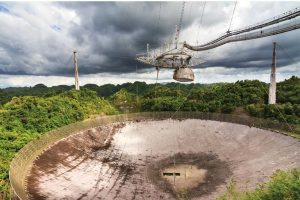2021 Initiatives
Furthering black hole research

In 2021, EPOC continued to collaborate with the Event Horizon Telescope (EHT) staff to better understand their network needs and current connections. This instrument is an international collaboration capturing images of black holes using a virtual Earth-sized telescope.
The EPOC team is working to help the EHT researchers use international research and education networks to share at least partial data sets, which had previously been impossible. Even being able to share smaller snippets of data in near-real time would potentially have a significant effect on the process of science for the astronomy teams.
Virtual Deep Dives
EPOC Deep Dives aim to understand the full research pipeline for collaborative teams and suggest alternative approaches for the scientists, local cyberinfrastructure (CI) support, and national networking partners to achieve their long-term research goals via workflow analysis, storage and computational tuning, and identification of network bottlenecks.
As COVID-related travel restrictions are still in place, EPOC engaged in a number of “virtual” Deep Dives, using more streamlined case study documents and additional video sessions to understand the basics, followed by sessions to walk through the data to identify the CI needs and requirements. The full set of participants then update the findings and EPOC staff combine the data and observations into a report that is reviewed and made public. This lighter approach to Deep Dives has shown itself to be effective through numerous engagements in 2021, and we expect it to continue even when travel restrictions are lifted.
Preserving Arecibo Observatory’s astronomical data

When the National Science Foundation’s Arecibo Observatory in Puerto Rico collapsed in late 2020, scientists scrambled to save its decades-worth of data.
The EPOC team played a pivotal role in helping move and store over 50 years of astronomical observations from the telescope. EPOC staff provided the expertise required to ensure all network paths were clean and performing as expected to be able to transfer petabytes of irreplaceable observation data from Arecibo to the Texas Advanced Computing Center (TACC), where it will be stored and made accessible to researchers.
This work took place as part of EPOC’s Roadside Assistance and Consulting service, an operations center and process pipeline for immediate help when data-sharing failures occur. As part of the Roadside Assistance service, EPOC helps coordinate with partners and organizations, across multiple network domains, to identify network failures and to work toward a resolution.
For their important work, EPOC and their collaborators received an HPCwire Readers’ Choice award for Best HPC Collaboration across Academia, Government, and Industry at the 2021 International Conference for High Performance Computing, Networking, Storage and Analysis (SC21).
